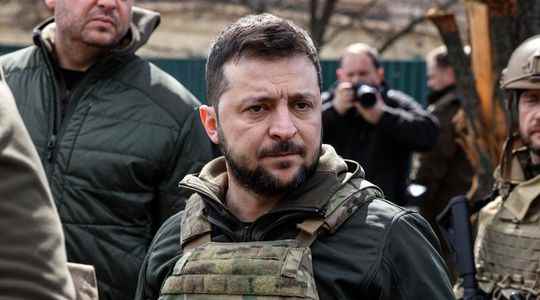From this Saturday, April 9, a curfew is established in the port city of Odessa, which is among the priority targets of the Russian army. The authorities fear that civilians will be targeted, as in Kramatorsk, where the destruction of the station claimed at least 52 victims.
Zelensky calls for ‘strong global response’ after Kramatorsk massacre
Ukrainian President Volodymyr Zelensky called for “a firm global response” after the deadly bombardment on Friday April 8 of a train station in eastern Ukraine, in Kramatorsk, where civilians were gathered to flee the region for fear of a Russian offensive, a massacre that aroused strong Western indignation. “This is another Russian war crime for which everyone involved will be held accountable,” Volodymyr Zelensky said in a video message, referring to the missile strike that killed 52 people, including five children, according to the latest record of local authorities.
“World powers have already condemned Russia’s attack on Kramatorsk. We expect a strong global response to this war crime,” he continued. The Ukrainian president is calling for a more massive supply of weapons from Western countries. On Friday evening, on the France 5 channel, the French Minister of Foreign Affairs, Jean-Yves Le Drian, called the attack a “crime against humanity.”
A curfew introduced in Odessa
A curfew will be in effect from Saturday evening until Monday morning in Odessa, Ukraine’s major Black Sea port, to protect civilians from the “threat” of missile strikes, local authorities said. After the bombing of the Kramatorsk station, “a threat of missile attack hovers in Odessa”, they estimated.
Ukraine has a “European future”
After her visit to the battered town of Boutcha, European Commission President Ursula Von der Leyen said Friday in kyiv that if Russia was going to sink into “economic, financial and technological depression”, Ukraine was walking, towards a “European future”. She also said she was convinced of the victory of Ukraine and democracy in this war.
A productive exchange between the United States and South Africa on Ukraine
South African President Cyril Ramaphosa spoke by telephone with US President Joe Biden on Friday, the day after the United Nations General Assembly voted on a resolution suspending Russia from the Human Rights Council. South Africa, whose government has been criticized for refusing to condemn Moscow’s invasion of Ukraine, is among the 58 countries that abstained from voting on the resolution.
President Cyril Ramaphosa tweeted that he had a “productive” phone call with Joe Biden. “We shared our views on the conflict in Ukraine and agreed on the need for a ceasefire and dialogue between Ukraine and Russia,” Cyril Ramaphosa wrote on Twitter. For his part, the American president emphasized “the strength of the bilateral partnership and the new global challenges caused by the Ukrainian crisis”.
London sanctions Putin’s daughters
After Washington and Brussels, it is the turn of the United Kingdom to sanction the two daughters of Russian President Vladimir Putin and that of the head of diplomacy Sergei Lavrov, saying that they want to attack the “lavish lifestyle of the inner circle of the Kremlin”.
They are now prohibited from entering British territory, where any possible assets will be frozen. British Prime Minister Boris Johnson has also announced that British military aid will be stepped up for Ukraine, with the dispatch of anti-tank and anti-aircraft missiles.
